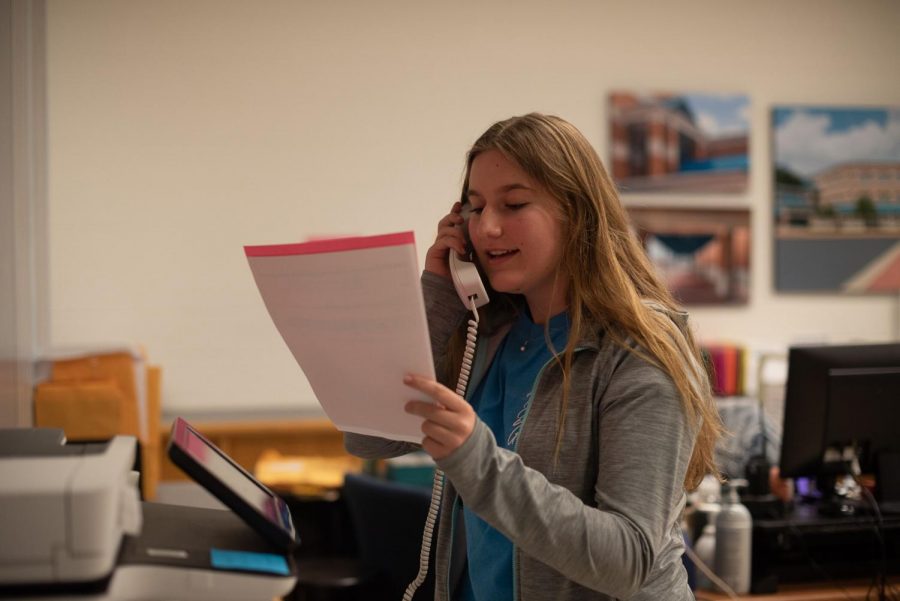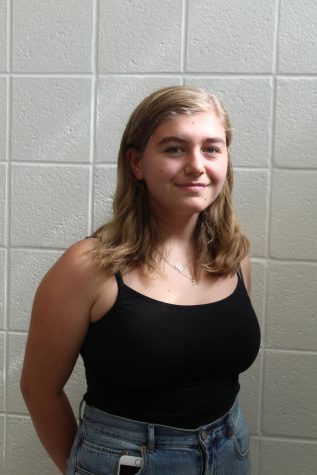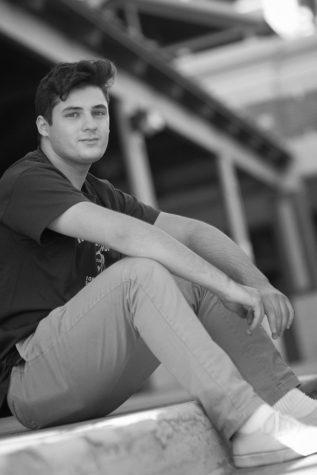“Good morning, Whitman!”
Getting to know the students behind the morning announcements
Junior Kat Gorlenko reads the last announcement before signing off. “The way you speak over the announcements can change a lot of people’s days, and how they feel, just through how you’re saying it,” Gorlenko said. “The emotions, the inflection, the energy — you don’t have your body or your face to show any of that. It’s just your voice,” Gorlenko said.
February 18, 2020
At the sound of the bell, all the students in room A303 burst into the halls. But while senior Lucas Folio’s classmates shuffle to their second period, he takes a detour to the main office.
There, he casually lays down his backpack and begins sorting through a thick pile of pink sheets, weeding out the ones from past dates. When the late bell rings at 8:36 a.m., Folio is queued to pick up the main office phone, dial pound-zero-zero and greet the school with his usual “Good Morning, Whitman. Please rise for the pledge of allegiance.”
Every day, the morning announcers recite the pledge of allegiance and read from a stack of pre-approved announcements, informing their peers and teachers about school events, administrative reminders and club news.
The tradition of Whitman students reading the morning announcements began under principal Jerome Marco’s administration. Marco believed that students would be more inclined to pay attention to their peers reading the announcements rather than administrators; he also believed that the morning announcements position would provide students with a new opportunity to get involved in school spirit, then-Vice Principal Alan Goodwin said.
“It just gives me something to look forward to,” morning announcer Kat Gorlenko said. “I love public speaking, but I hate it when I don’t have words in-front of me. It’s a form of public speaking that’s not stressful.”
Administrators hold auditions for the morning announcer position at the beginning of every school year. For the audition, students read the pledge of allegiance and several basic announcements so administrators can determine who speaks the clearest.
Once assistant principal Kristin Cody and secretary Blenda LeGrande choose the new announcers, the announcers from the previous year walk them through the process, teaching them the sequence of announcements and the importance of keeping their phones away from the PA system — it could mess up the radio connection.
Folio joined the announcement team second semester last year; he was the only non-senior at the time. This year, two more recruits, juniors Gorlenko and Thomas Robinson, have joined the team.
“I could not understand a thing the morning announcements were saying, and I was like, ‘I can do that — I’ll be clear because I do theater,’” Gorlenko said. “I’ll use my diction, and I’ll make sure everyone can hear the announcements.’”
This is Folio’s second year as a morning announcer. His teachers and a competition between him and his friend for who could get the position of morning announcer encouraged him to try out for the position.
In ninth grade, he developed his signature radio sound, mimicking the style of old-fashioned radio stars. His history teacher would ask him to use it during class to read the board, he said.
“She called me ‘the announcer’ before I even made it,” Folio said.
Gorlenko read the morning announcements at Pyle, and she’d been itching to do the Whitman announcements too, she said. She didn’t audition freshman or sophomore year, but she built up the courage to try-out this fall.
Reading the morning announcements has helped Gorlenko in her acting, she said.
“I’m a theater kid through and through,” Gorlenko said. “I love being on stage. I love acting through my face and my body. I take what I do on the morning announcements to my acting. You don’t think about your voice as being a big part of acting, but it really is.”
The morning announcements have also created a venue for Folio to pursue his passion for public speaking: he hopes to eventually become a radio host or sports announcer.
In the fall, he announced a Whitman boys varsity soccer game — an opportunity that came from his position as the morning announcer.
Gorlenko said she enjoys how the PA system offers a sense of security. Pyle video records their announcements, so Gorlenko had to watch herself read the announcements.
“It was a billion times more stressful than just doing it over the PA system,” she said.
Robinson also feels more comfortable reading into the public address system.
“I can’t see the reaction of anyone,” Robinson said. “I think it’d be harder if I had to actually do it on a stage in front of everyone.”
The announcers said that they love the little things about their job, whether it’s reading the “What the hecka is DECA?” announcement or periodically flipping through a thesaurus in search of a new weekday alliteration, from Magical Monday to Fantastic Friday.
“The way you speak over the announcements can change a lot of people’s days, and how they feel, just through how you’re saying it,” Gorlenko said. “The emotions, the inflection, the energy — you don’t have your body or your face to show any of that. It’s just your voice.”










